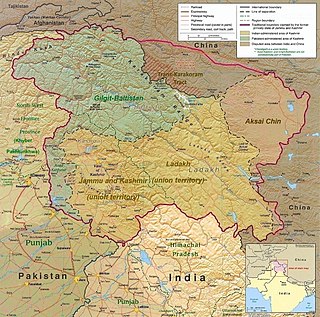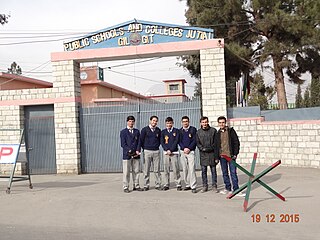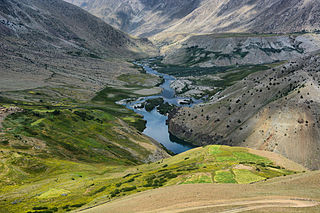Related Research Articles

Baltistan also known as Baltiyul or Little Tibet, is a mountainous region in the Pakistani-administered territory of Gilgit-Baltistan and constitutes a northern portion of the larger Kashmir region that has been the subject of a dispute between India and Pakistan since 1947. It is located near the Karakoram and borders Gilgit to the west, China's Xinjiang to the north, Indian-administered Ladakh to the southeast, and the Indian-administered Kashmir Valley to the southwest. The average altitude of the region is over 3,350 metres (10,990 ft). Baltistan is largely administered under the Baltistan Division.

Skardu is a city located in Pakistan-administered Gilgit-Baltistan in the disputed Kashmir region. Skardu serves as the capital of Skardu District and the Baltistan Division. It is situated at an average elevation of nearly 2,500 metres above sea level in the Skardu Valley, at the confluence of the Indus and Shigar rivers. The city is an important gateway to the eight-thousanders of the nearby Karakoram mountain range. The Indus River running through the region separates the Karakoram from the Ladakh Range.

The Skardu District is a district of Pakistan-administered Gilgit-Baltistan in the disputed Kashmir region. Skardu District is bounded on the east by the Ghanche District, on the south by the Kharmang District, on the west by the Astore District, on the north-west by the Rondu District and on the north by the Shigar district. The district headquarters is the town of Skardu, which is also the division headquarters.

The Shigar Valley is a valley in Gilgit Baltistan in northern Pakistan that is watered by the Shigar River, and centred on the town of Shigar. The valley stretches about 170 km from Skardu to Askole and is the gateway to the high mountains of the Karakoram. The town of Shigar is the largest settlement in the valley. Even though the Shigar Valley is a remote and largely inaccessible place, there are several villages in the valley. Askole is the last settlement in the Shigar Valley, which is still far from the high mountains. Shigar was an administrative sub-division of Skardu District before it was made a district in its own right.

Gilgit-Baltistan is an administrative territory of Pakistan in the northern part of the country. It was given self-governing status on August 29, 2009. Gilgit-Baltistan comprises 14 districts within three divisions. The four districts of Skardu Kharmang Shigar and Ghanche are in the Baltistan Division, four districts of Gilgit Ghizer Hunza and Nagar districts which were carved out of Gilgit District are in the Gilgit Division and the third division is Diamir, comprising Chilas and Astore. The main political centres are the towns of Gilgit and Skardu.

The Skardu Valley is located in Gilgit-Baltistan region of Pakistan. The valley is about 10 km wide and 40 km long. It is at the confluence of the Shigar River and Indus River. Surrounded by the giagantic Karakoram and Himalayas ranges and with its nearby lakes, it is an important tourist destination in Pakistan. Skardu is the main town of Baltistan along the wide bank of the river Indus. Skardu is the largest district of the Northern Areas. Baltistan is home to some of the highest peaks in the world, the Karakoram Range, Skardu is very popular with Mountaineering Expeditions. It is equally popular with high altitude trekkers, who treks to Baltoro Glacier, K2 Base Camp and Concordia. Skardu by road, lies approximately 5 hours away from Gilgit and 10 hours drive from Besham.

Gilgit-Baltistan, formerly known as the Northern Areas, is a region administered by Pakistan as an administrative territory and consists of the northern portion of the larger Kashmir region, which has been the subject of a dispute between India and Pakistan since 1947 and between India and China since 1959. It borders Azad Kashmir to the south, the province of Khyber Pakhtunkhwa to the west, the Wakhan Corridor of Afghanistan to the north, the Xinjiang region of China to the east and northeast, and the Indian-administered union territories of Jammu and Kashmir and Ladakh to the southeast.
Gilgit-Baltistan is an administrative territory of Pakistan that borders the province of Khyber Pakhtunkhwa to the west, Azad Kashmir to the southwest, Wakhan Corridor of Afghanistan to the northwest, the Xinjiang Uyghur Autonomous Region of China to the north, and the Indian-administered region of Jammu and Kashmir to the south and south-east.

Since its independence in 1947, governments have not spent much on quality education in this region. While the literacy rates of the areas in Gilgit is higher than most of the citites in Pakistan, yet no professional universities were constructed in the region. In 2002, under the reign of Pervez Musharraf, a general university of the name of Karakoram International University was constructed. Various primary schools were constructed by NGO's from around the world including the Aga Khan Development Network.

Rondu District, also spelled Roundu District, is a district of Pakistan-administered Gilgit-Baltistan in the disputed Kashmir region. It is one of 14 districts of Gilgit-Balistan. The district encompasses the entire Roundu Valley, which is the fourth-largest valley in Gilgit-Baltistan, after the Skardu, Khaplu, and Shigar valleys. The Roundu valley lies in the western part of the Baltistan Division and forms the main trade and travel route between the Baltistan Division and the Gilgit Division. The Rondu District was carved out of Skardu District in 2019.

Gultari Valley, located west of Kargil town with Skardu 288 km to its north and Dras in south, is amongst the biggest valleys of Pakistan-administered Baltistan on the disputed India Pakistan Line of Control (LoC) in Himalaya. It comprises three sub-valleys, Shingo, Saigar and Phultukus, with the majority people speaking the Shina language. Galtari is a district subdivision in Skardu District of Pakistan-administered Gilgit-Baltistan in the disputed Kashmir region, with 10,000 population spread across 16 revenue estate villages, some of which have several isolated hamlets.

The Gilgit−Baltistan Scouts, are a federal paramilitary force in Pakistan, tasked with law enforcement in the nominally autonomous territory of Gilgit-Baltistan and border guard duties. The force was formed in 2003 under the control of the Interior Ministry of Pakistan, but it claims a tradition dating back to the Gilgit Scouts formed during the British Raj era. However, the earlier Scouts unit is now a full infantry regiment of the Pakistan Army (see Northern Light Infantry Regiment, which mostly operates in the same region as the current Scouts.

Tourism in Gilgit-Baltistan, an administered territory of Pakistan, focuses on its access to various mountain ranges and alpine terrain. Various tourist destinations attract millions of travelers from within Pakistan. On the other hand, tourists from other countries also routinely visit GB. An estimated 1.72 million tourists visited the region in 2017 according to the Pakistan Tourism Development Corporation (PTDC). Travelers had contributed Rs.300 million to the local economy in 2017. The authorities were expecting 2.5 million tourists in 2018 which would have meant an additional Rs.450 million to the economy.
Arandu may refer to:

Baltistan Division is a first-order administrative division of Pakistan-administered Gilgit-Baltistan in the disputed Kashmir region. It overlaps with the historical Baltistan region.
Strategic Highway 1 (S-1), also known as the Gilgit–Skardu Road or Skardu Road, is a 167-kilometre-long highway in Pakistan that links the cities of Gilgit and Skardu in Gilgit−Baltistan. It was constructed by the Pakistan Army Corps of Engineers and the Association of Chinese Engineers from 1970 to 1982.

Tormik is a valley in the Karakorum mountain ranges in the Skardu District of Gilgit-Baltistan, Pakistan. The valley has its source at the Stak-la and Basha valley lies to its east and Stak Valley to its west.
Fida Muhammad Nashad is a senior Pakistani politician from Gilgit Baltistan who served as the 2nd speaker of the Gilgit Baltistan Assembly. He was a member of the Pakistan Muslim League N. He joined Pakistan Tehreek-e-Insaf. He is the chairman of Baltistan Culture and Development Foundation (BCDF).
The Gilgit-Baltistan Chief Court is the court of appeals in the region of Gilgit-Baltistan, Pakistan. The decisions of the court are appealed to Supreme Appellate Court Gilgit-Baltistan. The court acts under 2009 Gilgit-Baltistan Empowerment and Self-Governance Order and has the equal status as of other high courts of Pakistan. The Permanent Seat of the Court is at Gilgit, but the Court also sits from time to time at Skardu Branch Registry.
References
- ↑ "Arondu (Arundu; Arandu), Basha Valley (Basha Nala; Basna), Skardu district, Baltistan, Gilgit-Baltistan (Northern Areas), Pakistan". Mindat.org. 2017-02-20. Retrieved 2017-05-22.